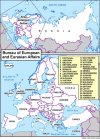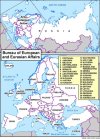The inspiration for the title: "Is the US interested in destabilizing the EU and Europe in order to assume more control of resources and trade?" is a section from the Cassiopaean transcript, Session 13 May, 2017
There are several threads dedicated to individual areas and problems of Europe, like Ukraine, Poland, Scandinavia, Belarus, Nagorno-Karabakh War - Armenia vs Azerbaijan, Events in Russia, Huge Protests in Romania, French Election Result or from our Orwellian World: Mass protests in Macedonia: US attempting Maidan v2.0 in Skopje? In several of the posts in these threads and in articles on Sott.net one can find evidence of the US having a destabilizing influence on Europe. On the surface of events much of US aggression is targeted against Russia, but does this one sided presentation on the part of the US also hide its real intention towards the non-Russian parts of Europe like the EU. At least the EU has paid a very high price for the so-called anti-Russian sanctions, so much so that their effect could also be interpreted as being equivalent to anti-EU sanctions that the US wanted and convinced or forced its "allies" within the EU to accept.
Recently there was an article by Thierry Meyssan: Chaos, control and the Middle East peace process It seems to me that much of what Thierry Meyssan writes about the Middle East is of relevance to the EU. For instance:
Ukrainian General: US is advising Kiev to unleash 'chaos' In Donbass and with regard to the Ukraine, one recalls the role of Victoria Nuland' from the US State Department around 2013-2015
Loony Nuland fumes over Minsk agreement, gives instructions to 'fight against the Europeans' And the US has been successful. In Poland some estimate there are now about 2 million migrants from the Ukraine.
An open letter to Europe's leaders: "F*ck the EU" was an insult, not a command!
And what are some of the reactions to or consequences of these policies:
Europe is the loser in Washington's geopolitical games against Russia - Lavrov
America the Global Empire: French bank pays huge US fine for doing business in Cuba and Iran and there have been similar cases which one could list and discuss the extent to which they were justified.
There are some attempts among to European leaders to gain more independence, but are they realistic?
#ICYMI: France and Germany want a new EU army, what could possibly go wrong?
In creating an EU army, could Europe easily get rid of American political diktat?
Merkel joins Macron in call for European army - There's just the small issue of NATO treaties
What do others think about this subject?
One could ask if the idea put forward in the session from 2017 about the goals of the US Government or among part of its power elite has not been an agenda for many years. In order to decide on the question about US Government interference, one has to collect data, because the process is not complete. Any amount of data in favour of a case may not convince everyone, and that is not the goal, personally I would like to just understand the issue, this sector of reality more clearly.[....]
A: US wishes to destabilize EU similar to Syria so that they can come in and "fix" things. i.e. rule and control resources and trade the "American way". Everyone will speak English!
Q: [laughter] (Pierre) They sure have a sense of humor, but I'm not sure that will be the only consequence...
(L) So basically, some kind of cabal in the deep state of the US is at the bottom of some kind of One World Order plan to really basically bit by bit take the entire planet under its control. Is that it either overtly or covertly?
A: Covertly at present, but overtly eventually.
There are several threads dedicated to individual areas and problems of Europe, like Ukraine, Poland, Scandinavia, Belarus, Nagorno-Karabakh War - Armenia vs Azerbaijan, Events in Russia, Huge Protests in Romania, French Election Result or from our Orwellian World: Mass protests in Macedonia: US attempting Maidan v2.0 in Skopje? In several of the posts in these threads and in articles on Sott.net one can find evidence of the US having a destabilizing influence on Europe. On the surface of events much of US aggression is targeted against Russia, but does this one sided presentation on the part of the US also hide its real intention towards the non-Russian parts of Europe like the EU. At least the EU has paid a very high price for the so-called anti-Russian sanctions, so much so that their effect could also be interpreted as being equivalent to anti-EU sanctions that the US wanted and convinced or forced its "allies" within the EU to accept.
Recently there was an article by Thierry Meyssan: Chaos, control and the Middle East peace process It seems to me that much of what Thierry Meyssan writes about the Middle East is of relevance to the EU. For instance:
. Is the US fomenting chaos in Europe?Since 2001, the Pentagon has adopted the doctrine of Admiral Arthur Cebrowski, Donald Rumsfeld's choice for Director of the Office of Force Transformation. The objective is no longer to grab natural resources for the USA, but to control the access of other powers to these resources. For that, it will be necessary to maintain indefinitely a state of chaos that only US Forces can contain. According the formula of President George W. Bush, this is to be an « endless war », which the USA must neither lose nor win [1]
Ukrainian General: US is advising Kiev to unleash 'chaos' In Donbass and with regard to the Ukraine, one recalls the role of Victoria Nuland' from the US State Department around 2013-2015
Loony Nuland fumes over Minsk agreement, gives instructions to 'fight against the Europeans' And the US has been successful. In Poland some estimate there are now about 2 million migrants from the Ukraine.
An open letter to Europe's leaders: "F*ck the EU" was an insult, not a command!
And what are some of the reactions to or consequences of these policies:
Europe is the loser in Washington's geopolitical games against Russia - Lavrov
America the Global Empire: French bank pays huge US fine for doing business in Cuba and Iran and there have been similar cases which one could list and discuss the extent to which they were justified.
There are some attempts among to European leaders to gain more independence, but are they realistic?
#ICYMI: France and Germany want a new EU army, what could possibly go wrong?
In creating an EU army, could Europe easily get rid of American political diktat?
Merkel joins Macron in call for European army - There's just the small issue of NATO treaties
What do others think about this subject?




